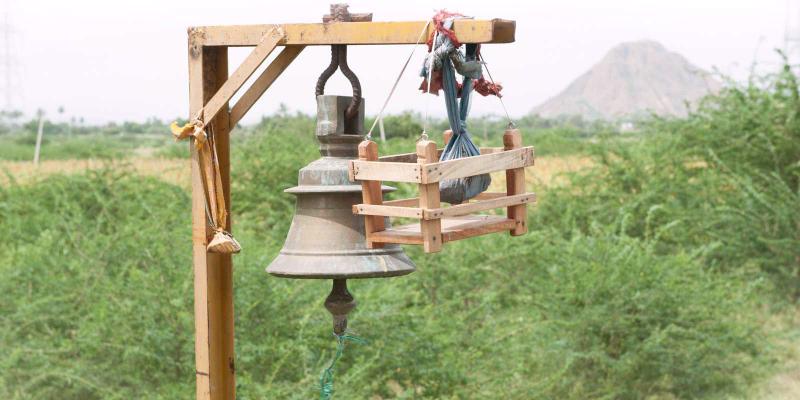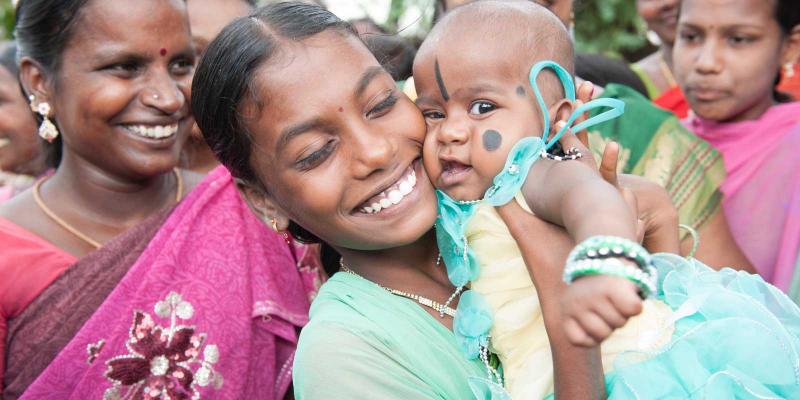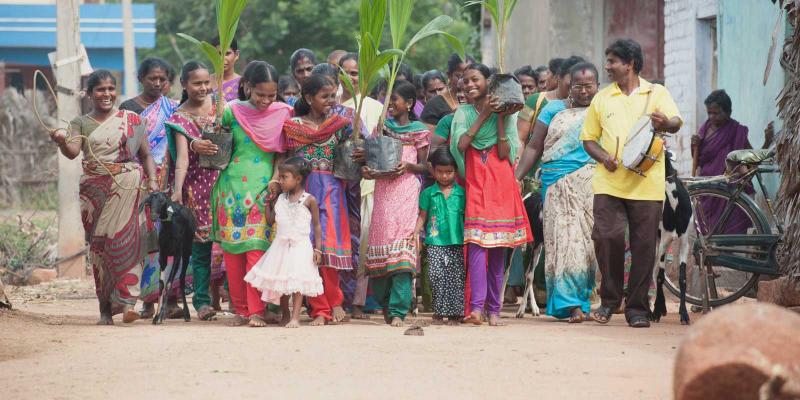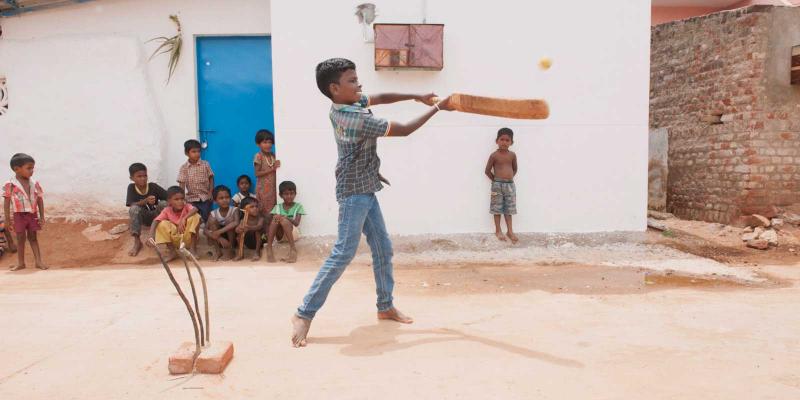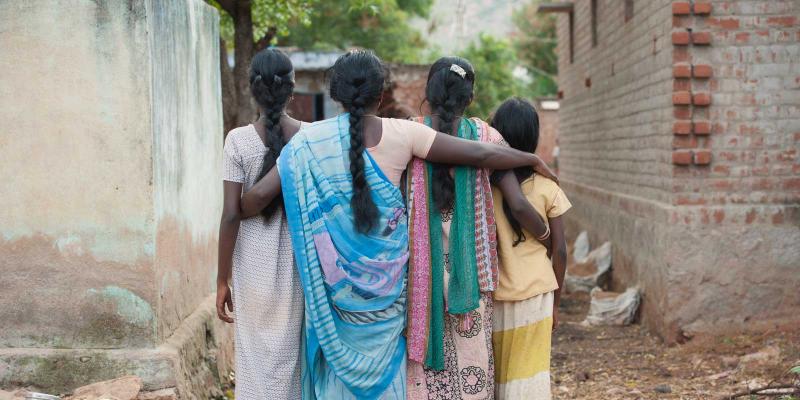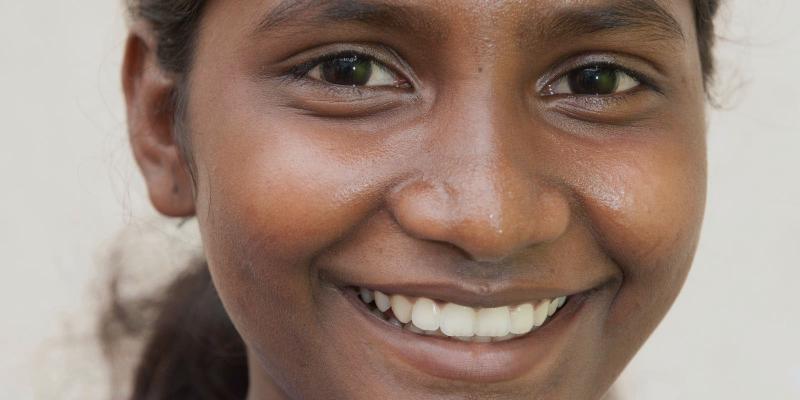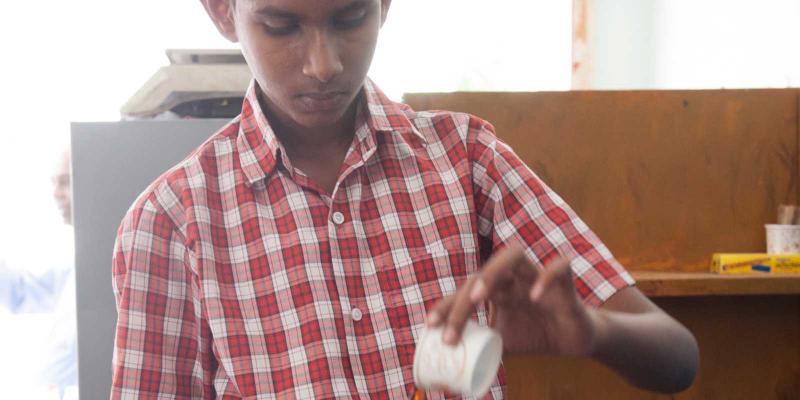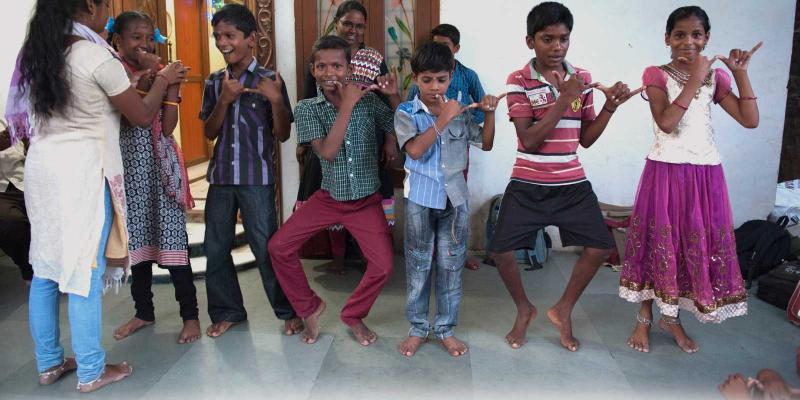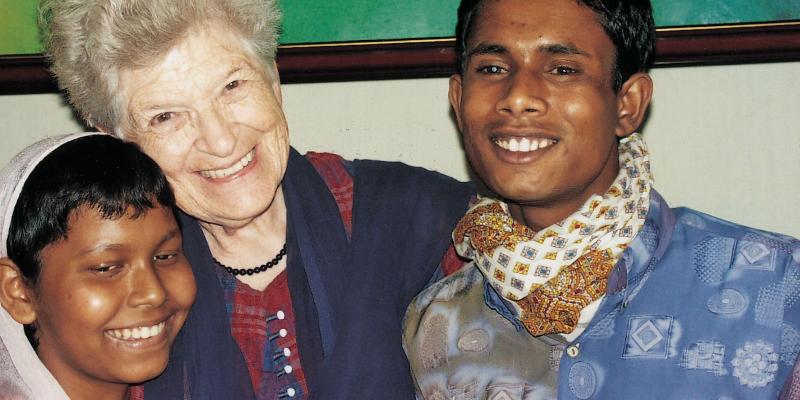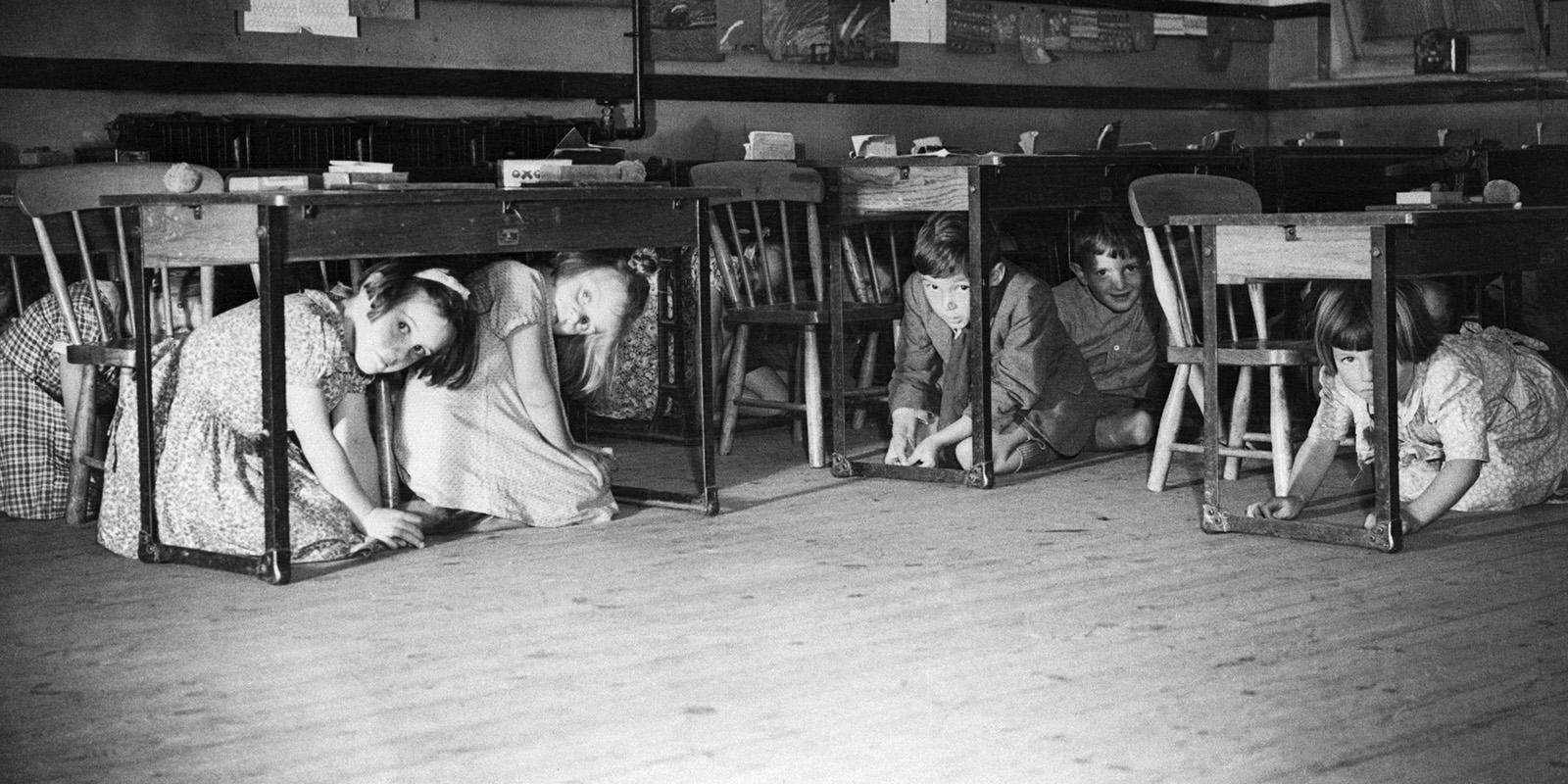
It is evening when Rosi, 17, arrives at the hospital to visit her father, who suffers from pneumonia. Many of the other patients have severe burns. The war has been going on for four years, and now the bombs fall almost every night.
Suddenly the sirens sound, and Rosi hears the rumble of bombers overhead. A terrible explosion shakes the building, and all the windows shatter. Nurses come running to help the screaming patients out of bed and down into the basement. Rosi and her father are the only ones left. As she shouts for help there is a deafening bang, as the ceiling cracks and caves in. Rosi manages to lift her father out of bed and drag him down the stairs. Through the window, she can see the bombs raining down from the sky. All the fires and explosions are lighting up the sky like daylight.
Everyone takes shelter in the basement, but soon the hospital catches fire, so they flee out into the garden. Once outside, all those who can stand up build a human chain to try to put the fire out. For hours, Rosi runs back and forth with buckets of water, and by morning the fire is out. She and her father have survived, but much of the hospital has been destroyed. Later, as Rosi walks through the city towards the small health centre where she works, fires still burn in the streets. Smoke rises from ruined houses, and the streets are littered with burnt bodies that nobody has had a chance to attend to yet.
Rosi escapes Shortly after this, Rosi’s workplace is also destroyed by a bomb. She and her father decide to flee the city along with thousands of others. It’s a dangerous journey, as the bombers attack train tracks and roads too. One night, Rosi’s father can no longer walk. So Rosi steals a wheelbarrow to carry her father and their bags. They manage to get to the next train station, 20 km away, and finally reach Rosi’s mother, who has already fled the city to the safety of the countryside. Just a few weeks later, in May 1945, the war comes to an end. Rosi is glad that Hitler and the Nazis are gone, but she grieves for the many millions of innocent people who have died.
Nazi Germany was dangerous for anyone who didn’t agree with or do exactly what the Nazis said.
Democracy abolished Rosi was only six years old when Adolf Hitler and his Nazi party came to power in Germany in 1933. They abolished all democratic rights and persecuted, imprisoned and killed everyone who didn’t ‘fit in’ to their dream society. The Nazis believed that they belonged to a particular type of people, an ‘Aryan race’, which was superior to all other races. Some groups were seen as a threat that should be eliminated. For example, six million Jews and hundreds of thousands of Roma died in the Nazi attempt to ‘exterminate’ whole ethnic groups. But Nazi Germany was dangerous for anyone who didn’t agree with or do exactly what the Nazis said. Rosi’s parents felt that Hitler’s racist ideas went against everything in their Christian beliefs of humanity and dignity. They listened in secret to radio broadcasts from other countries, to find out the truth about what was going on. But their neighbours, who were Christians too, were committed Nazis. One of their boys used to play with Rosi’s brother. “Be careful what you say when he’s here,” said Rosi’s parents. If the boy told his parents that Rosi’s family didn’t like Hitler, they could all end up in a prison camp. The Nazis banned all political parties and burned books that they didn’t like. They banned all youth organisations and instead started Hitlerjugend (Hitler Youth). When Rosi and her friends broke the rules and met at their local church, some boys from the Hitler Youth gathered outside, shouting slogans and attacked Rosi and her friends when they came out. Rosi was angry and wanted to speak out against the Nazis, but a young priest talked her out of it. It was too dangerous.
A tough choice When the war ended in 1945, Rosi and her parents returned to Bonn, where 90 percent of the buildings had been damaged or destroyed. Rosi’s home was still there, but three homeless families had moved into their old apartment and now they all had to share the space. Rosi studied to become a teacher. In her spare time she worked in a slum in Bonn helping poor children, young people, and the elderly. Everything was scarce – shelter, food, clean water, clothes and school supplies. But with hard work, life slowly returned to normal. One day Rosi told her parents that she had made a tough decision. “I’m never going to get married.” Back then, over 70 years ago, it was almost unthinkable for a woman to have both a job and a family. Married women were expected to spend all their time taking care of their homes and families. Rosi wanted to be free to help others in need.
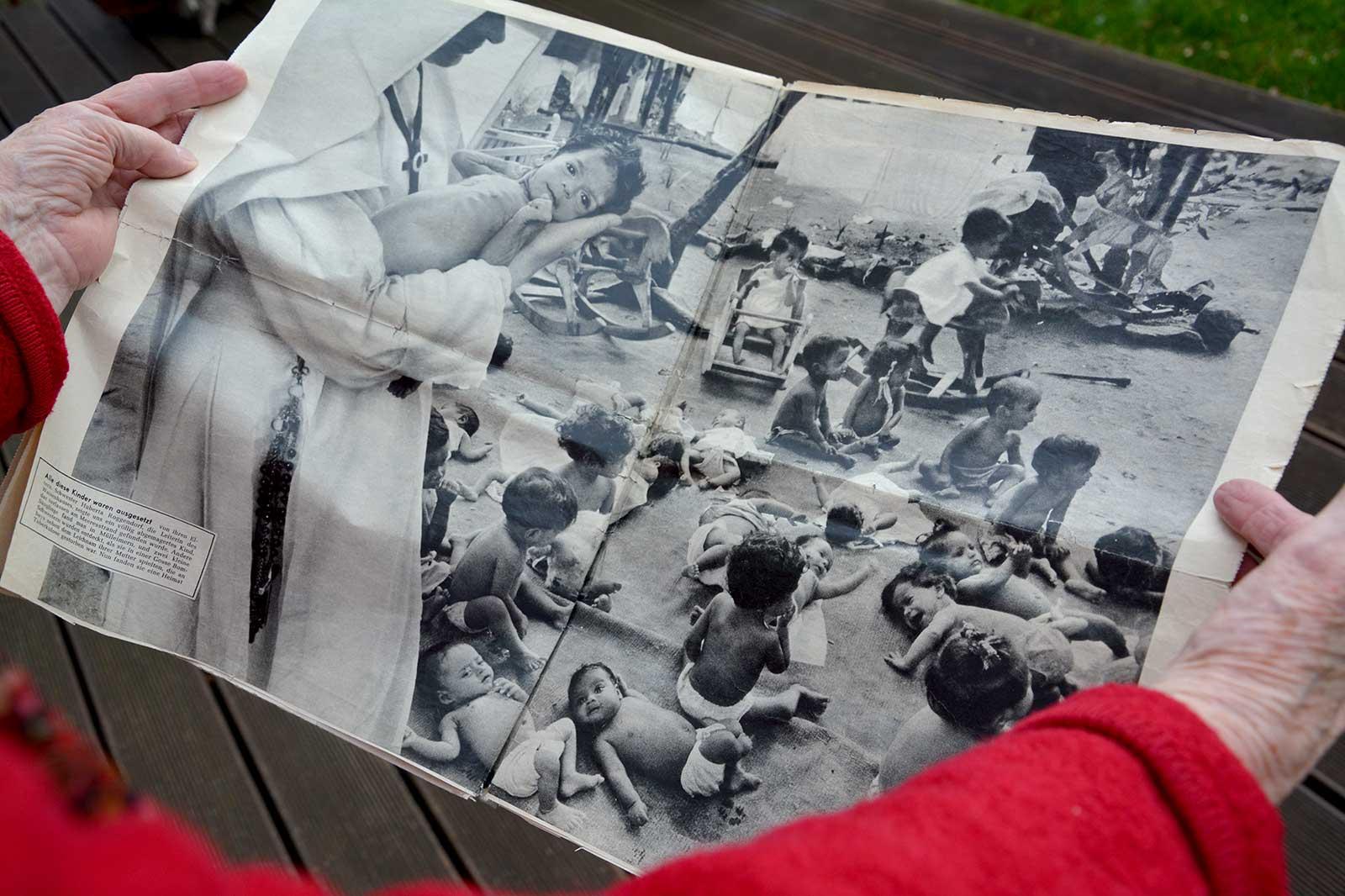
A student brought the newspaper that would change Rosi’s life.
India calling After a few years as a teacher, Rosi had a happy and fulfilling life where she was helping many people. Still, she sometimes wondered if this was to be her life’s work. The answer came from an unexpected source. One morning, a student showed her a newspaper article about an orphanage in Andheri in India. “The children get less than a handful of rice to eat every day. We have to do something,” said the girl. Rosi thought that India seemed very far away, but she finally wrote to the orphanage and asked what they needed. Then her students donated 400 parcels containing basic essentials – one for every child at the orphanage. After they had been sent, other people started to donate, and soon Rosi’s small bedroom in her parent’s apartment was crammed from floor to ceiling with gifts: potties, 65 metres of fabric, a refrigerator, medicine and clothes. Rosi decided to go to India herself to hand over the donations– a journey that was to change her life.
A different kind of poverty The poverty in India felt familiar to Rosi. During the war she had seen many people living on the streets, starving and dying. But there was a big difference. In Germany, the suffering during the war was temporary. But here, the poverty was seen as completely normal, while many other Indians lived in luxury. Hardly anyone talked about the injustice of it. At the orphanage, Rosi was welcomed with open arms. The children hung so many flower garlands around her neck she could hardly breathe! Now, Rosi got to know children that she had previously only seen in pictures. Sweety, who was four, had been found on the street with her eyes burnt out. Two girls had been kidnapped from their village and sold to a brothel. Other girls had been sexually abused and become pregnant, and been thrown out of their families as a result. The nuns who ran the orphanage explained that most of the children were not really orphans, but that their families were too poor to take care of them.
Rosi couldn’t sleep at night. She often cried tears of sorrow and rage, because it was so unfair that parents had to give up their children because of poverty. “Children need love more than anything else,” she thought to herself. “Are we doing the right thing? If children are hungry, we give them food. If children are sick, we give them medicine. But shouldn’t we be tackling the roots of these problems?” When Rosi was returning home, she promised to come back soon. Now she knew that her life’s work, the reason why she had given up the thought of having children of her own, was in India.
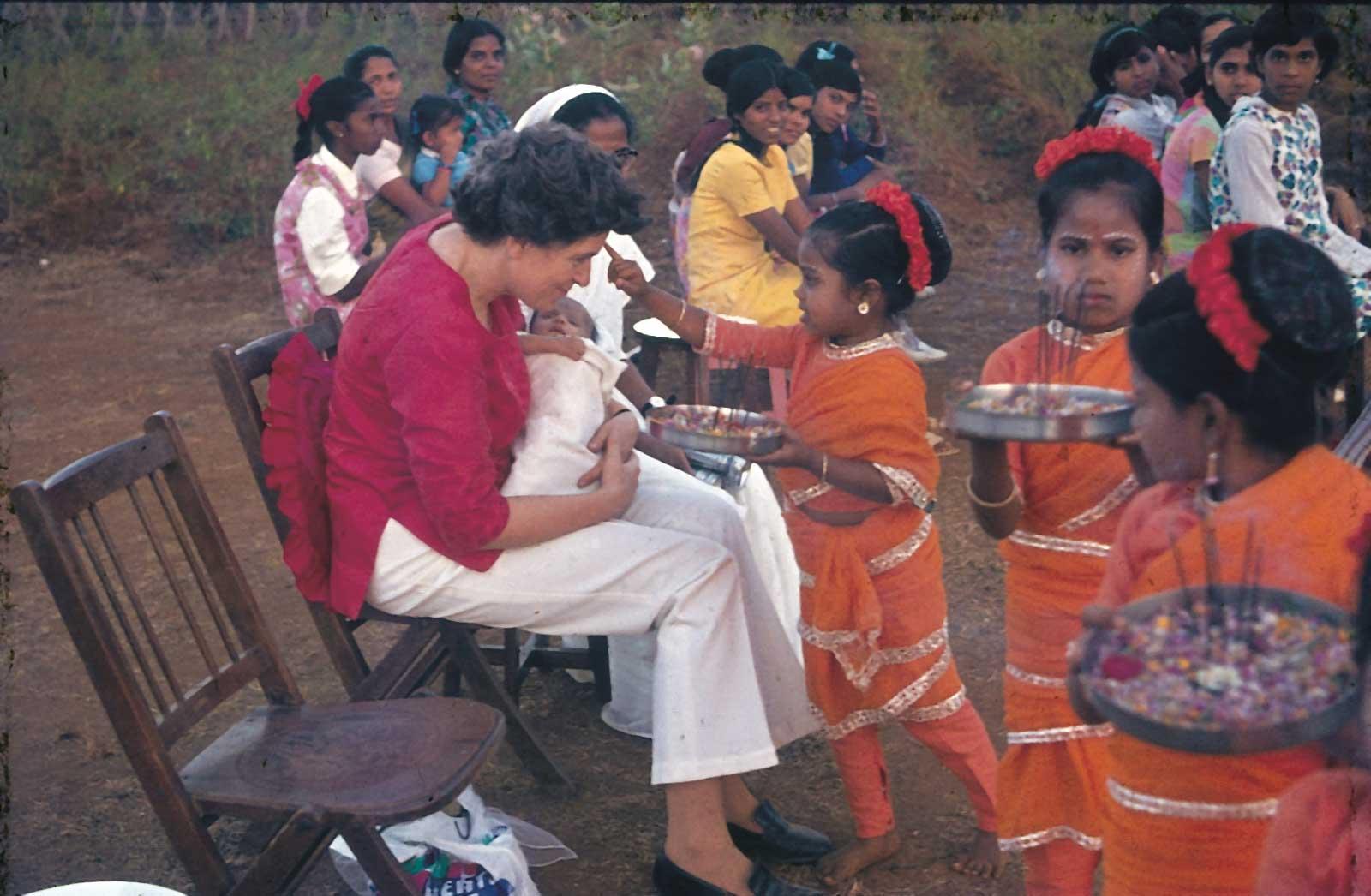
Women change the world The children’s shelter in Andheri wanted to start a small farm to provide food, milk and an income for the children. Rosi raised funds to get it going, and soon there was a vegetable patch and the first few hens and goats. Rosi started her own organisation and called it Andheri-Hilfe (Help for Andheri). She travelled many times to India, meeting and encouraging people in villages and slums to develop ideas and programmes. Local leaders formed their own organizations and together they started to tackle the roots of poverty, for example by offering job training to women. Once mothers had an income they could bring their children home. After some years, 40,000 children had been reunited with their families instead of growing up in orphanages. “This is the proof that women can change the world,” says Rosi. “I learned that charity was not the answer. A human being cannot be ‘developed’ – one can only develop oneself,” says Rosi. “ Rosi soon had to give up teaching to work full time for Andheri-Hilfe. She refused to accept any salary, content to live on her small teacher’s pension. Today, Andheri-Hilfe has grown into a renowned organisation, supporting about 150 development projects by joining hands with partner organisations in India and Bangladesh.
Eradicating poverty Rosi has never regretted the fact that she didn’t get married. Andheri-Hilfe and the people are her family. She even has an adopted daughter, Maryann, who came to Germany from the children’s home in Andheri as a helping hand. She still lives and works with Rosi. “We will never stop fighting for the rights of people living in poverty,” Rosi says. “One tenth of the world’s population owns about 85% of the world’s resources. Half of the global population owns less than one percent. We cannot accept injustice on this scale.” Rosi will soon be 90 years old, but says she will never stop working. “I have had the privilege of walking alongside so many people on their way to a happier and more dignified life. No wonder I am happy too!”
Text: Carmilla Floyd
Photo: Kim Naylor
Related stories
Långgatan 13, 647 30, Mariefred, Sweden
Phone: +46-159-129 00 • info@worldschildrensprize.org
© 2020 World’s Children’s Prize Foundation. All rights reserved. WORLD'S CHILDREN'S PRIZE®, the Foundation's logo, WORLD'S CHILDREN'S PRIZE FOR THE RIGHTS OF THE CHILD®, WORLD'S CHILDREN'S PARLIAMENT®, WORLD'S CHILDREN'S OMBUDSMAN®, WORLD'S CHILDREN'S PRESS CONFERENCE® and YOU ME EQUAL RIGHTS are service marks of the Foundation.



